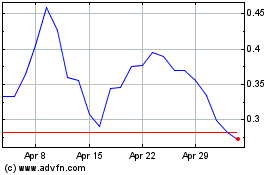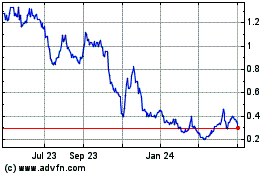Yale Researchers Find Phenoxodiol Restores Sensitivity to Chemotherapy in Some Women With Ovarian, Fallopian Tube or Primary Pe
March 29 2006 - 9:28AM
PR Newswire (US)
WASHINGTON and SYDNEY, Australia, March 29 /PRNewswire-FirstCall/
-- Phenoxodiol, an investigational anti-cancer drug that is being
studied by leading researchers at Yale, has been found to be active
and to restore platinum drug sensitivity to some patients who have
shown prior resistance to platinum-based chemotherapy agents. The
data were presented at the Annual Meeting on Women's Cancer
organized by the Society of Gynecologic Oncology. The study is
designed to test the ability of phenoxodiol to reverse the
resistance that develops in most ovarian cancers to standard
chemotherapy. The study was conducted at Yale - New Haven Hospital,
Conn., USA, as well as at the Royal Women's Hospital, Melbourne,
Australia. "Phenoxodiol was developed to overcome this chemical
resistance within tumor cells, thereby allowing standard
anti-cancer drugs such as cisplatin, carboplatin and paclitaxel to
continue to work in this aggressive form of cancer," said Michael
Kelly, MD, Fellow at Yale University School of Medicine. "What we
are seeing with phenoxodiol is an encouragingly high proportion of
tumors either shrinking or stabilizing with standard drugs, when we
know that the tumor is unlikely to respond to those standard drugs
alone." Patients with tumor shrinkage or stabilized tumors are
collectively known as having controlled disease. The particular
relevance of this outcome is that the FDA's current draft guidance
document suggests that prolonged survival of patients is a more
appropriate clinical endpoint than tumor response alone. That is,
the length of time that the tumor fails to grow, may be more
meaningful in terms of patient survival than the incidence of tumor
response on its own. The Yale researchers reported that 74 percent
of patients with late-stage, platinum-resistant tumors who received
the phenoxodiol and cisplatin combination showed evidence of a
change in tumor growth by way of either tumor shrinkage or no
increase in tumor size. The ability of phenoxodiol to effect
patient survival and progression-free survival is to be tested in a
pivotal study known as the OVATURE study, in which phenoxodiol will
be used in combination with carboplatin in patients with tumors
that are refractory or resistant to platinum therapy. About ovarian
cancer Ovarian cancer is the gynecologic cancer most likely to lead
to death among women in the U.S., due in part to the eventual
development of resistance of the tumor to chemotherapy. In
approximately 10 to 15 percent of patients, the tumors show a high
level of resistance to initial, standard therapy. In the remaining
85 to 90 percent of initial responders, the tumors eventually
re-grow in most of these patients due to the selection of
chemo-resistant tumor cells. Ultimately these tumors become
completely resistant to standard drugs. The research was conducted
at Yale in collaboration with co-authors Gil Mor, M.D., Lisa Baker,
Jessica McAlpine, Masoud Azodi, Peter Schwartz, M.D., and Thomas
Rutherford, M.D. Participants were also recruited from the Royal
Women's Hospital, Melbourne, Australia. Additional research was
conducted at Royal Women's Hospital, Melbourne, Australia; Marshall
Edwards, Inc., Sydney, Australia; and at Ohio State University,
Columbus, Ohio. About phenoxodiol Phenoxodiol is an investigational
drug and, as such, is not marketed in the United States.
Phenoxodiol was granted fast-track status by the FDA in November
2004 for its intended use in women with ovarian cancer. Phenoxodiol
is a novel acting drug that inhibits key pro-survival signaling
pathways generated by the sphingomyelin pathway. These pathways
(eg. sphingosine-1-phosphate) are over-active in tumor cells, and
their inhibition by phenoxodiol leads to the prevention of
production of key pro- survival proteins such as XIAP. XIAP, an
anti-apoptotic protein, prevents cell death by blocking signals
coming from the death receptors on the cell surface. Removal of
such anti-apoptotic proteins restores the ability of tumor cells to
undergo apoptosis in response to chemotherapy. The putative primary
molecular target of phenoxodiol is a family of proteins expressed
on the surface of tumor cells, but not on non-tumor cells. The
restriction of expression of that family of proteins to tumor cells
is thought to account for the high specificity of phenoxodiol.
Phenoxodiol is able to kill ovarian cancer cells that are highly
resistant to standard anti-cancer drugs, as well as being able to
restore sensitivity in these cells to standard anti-cancer drugs
such as taxanes. These findings have been borne out in recent
clinical results showing that some women who have stopped
responding to taxane and platinum drugs had disease regression when
phenoxodiol was given in combination with their chemotherapy. About
Marshall Edwards, Inc. Marshall Edwards, Inc. (NASDAQ:MSHL) has
licensed rights from Novogen Limited (NASDAQ:NVGN) to bring
phenoxodiol to market globally. Marshall Edwards, Inc. is majority
owned by Novogen, an Australian biotechnology company that is
specializing in the development of therapeutics based on regulation
of the sphingomyelin pathway. Novogen, based in Sydney, Australia,
is developing a range of therapeutics across the fields of
oncology, cardiovascular disease and inflammatory diseases. More
information on phenoxodiol and on the Novogen group of companies
can be found at http://www.marshalledwardsinc.com/ and
http://www.novogen.com/. Under U.S. law, a new drug cannot be
marketed until it has been investigated in clinical trials and
approved by the FDA as being safe and effective for the intended
use. Statements included in this press release that are not
historical in nature are "forward-looking statements" within the
meaning of the "safe harbor" provisions of the Private Securities
Litigation Reform Act of 1995. You should be aware that our actual
results could differ materially from those contained in the
forward-looking statements, which are based on management's current
expectations and are subject to a number of risks and
uncertainties, including, but not limited to, our failure to
successfully commercialize our product candidates; costs and delays
in the development and/or FDA approval, or the failure to obtain
such approval, of our product candidates; uncertainties in clinical
trial results; our inability to maintain or enter into, and the
risks resulting from our dependence upon, collaboration or
contractual arrangements necessary for the development,
manufacture, commercialization, marketing, sales and distribution
of any products; competitive factors; our inability to protect our
patents or proprietary rights and obtain necessary rights to third
party patents and intellectual property to operate our business;
our inability to operate our business without infringing the
patents and proprietary rights of others; general economic
conditions; the failure of any products to gain market acceptance;
our inability to obtain any additional required financing;
technological changes; government regulation; changes in industry
practice; and one-time events. We do not intend to update any of
these factors or to publicly announce the results of any revisions
to these forward-looking statements. DATASOURCE: Marshall Edwards,
Inc. CONTACT: Graham Kelly, Ph.D, Chairman of Marshall Edwards,
Inc., +1-203-247-1322; or David Sheon, +1-202-518-6321, for
Marshall Edwards, Inc. Web site: http://www.marshalledwardsinc.com/
http://www.novogen.com/
Copyright
Kazia Therapeutics (NASDAQ:KZIA)
Historical Stock Chart
From Jun 2024 to Jul 2024

Kazia Therapeutics (NASDAQ:KZIA)
Historical Stock Chart
From Jul 2023 to Jul 2024
